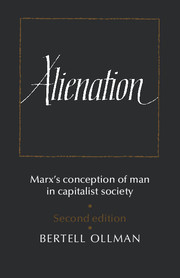Book contents
- Frontmatter
- Contents
- Preface to the second edition
- Note on translations
- Acknowledgements
- General introduction
- PART I PHILOSOPHICAL INTRODUCTION
- PART II MARX'S CONCEPTION OF HUMAN NATURE
- PART III THE THEORY OF ALIENATION
- 18 The theory of alienation
- 19 Man's relation to his productive activity
- 20 Man's relation to his product
- 21 Man's relation to his fellow men
- 22 Man's relation to his species
- 23 The capitalist's alienation
- 24 The division of labor and private property
- 25 The labor theory of value: labor-power
- 26 Value as alienated labor
- 27 The metamorphosis of value
- 28 The fetishism of commodities
- 29 Class as a value Relation
- 30 State as a value Relation
- 31 Religion as a value Relation
- 32 Marx's critique of bourgeois ideology
- PART IV CONCLUSION
- Appendix I In defense of the philosophy of internal relations
- Appendix II Response to my critics: more on internal relations
- Notes to the text
- Bibliography of works cited
- Index of names and ideas
- Cambridge Studies in the History and Theory of Politics
23 - The capitalist's alienation
Published online by Cambridge University Press: 05 June 2012
- Frontmatter
- Contents
- Preface to the second edition
- Note on translations
- Acknowledgements
- General introduction
- PART I PHILOSOPHICAL INTRODUCTION
- PART II MARX'S CONCEPTION OF HUMAN NATURE
- PART III THE THEORY OF ALIENATION
- 18 The theory of alienation
- 19 Man's relation to his productive activity
- 20 Man's relation to his product
- 21 Man's relation to his fellow men
- 22 Man's relation to his species
- 23 The capitalist's alienation
- 24 The division of labor and private property
- 25 The labor theory of value: labor-power
- 26 Value as alienated labor
- 27 The metamorphosis of value
- 28 The fetishism of commodities
- 29 Class as a value Relation
- 30 State as a value Relation
- 31 Religion as a value Relation
- 32 Marx's critique of bourgeois ideology
- PART IV CONCLUSION
- Appendix I In defense of the philosophy of internal relations
- Appendix II Response to my critics: more on internal relations
- Notes to the text
- Bibliography of works cited
- Index of names and ideas
- Cambridge Studies in the History and Theory of Politics
Summary
Alienation has been discussed up till now as if it were primarily a working class phenomenon. Yet, if alienation is taken to be a set of relations between people and nature, both animate and inanimate, then many of the traits observable in the proletariat can be found, only slightly altered, in other classes. The connection Marx sees between proletarian alienation and that of the rest of mankind is expressed in his claim that ‘the whole of human servitude is involved in the relation of the worker to production, and every relation of servitude is but a modification and consequence of this relation’. By producing alienated material objects and, in the process, themselves as an alienated class, the proletariat can be said to produce the alienation of people with whom they and their products have relations. Consequently, we should not be surprised that ‘the emancipation of the workers contains universal human emancipation’.
We have already heard Marx declare that capitalists as well as workers are alienated. However, only once did he attempt to present his views on this subject in an organized fashion. What follows are his comments on this occasion:
First it has to be noticed that everything which appears in the worker as an activity of alienation, of estrangement, appears in the non-worker as a state of alienation, of estrangement. […]
- Type
- Chapter
- Information
- AlienationMarx's Conception of Man in a Capitalist Society, pp. 153 - 156Publisher: Cambridge University PressPrint publication year: 1977



